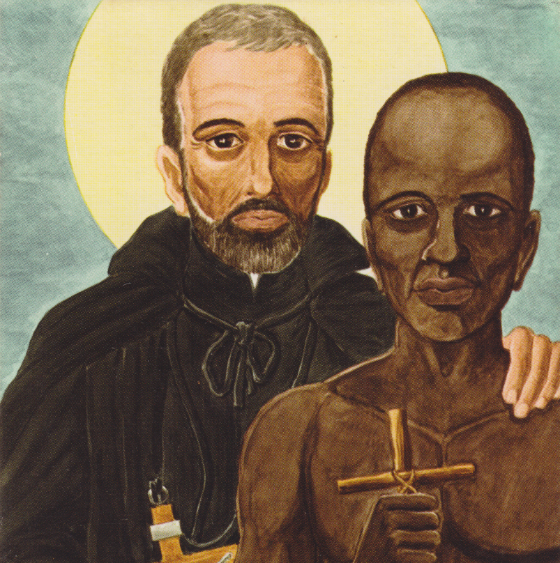
September 9
St. Peter Claver
Life (1580-1654)
The Americas, where St. Peter Claver worked and died as a Jesuit missionary, should be grateful to God for the gift of this truly great servant of the black slaves. Claver, a native of Catalonia in Spain, early opted for the secular priesthood. In 1602, however, having graduated from the University of Barcelona, he applied for entrance into the Society of Jesus. His assignment to teach at the Jesuit college in Palma, Majorca, was providential, for there he fell under the influence of the holy Jesuit lay brother Alfonso Rodriguez. It was Rodriguez who persuaded Peter to ask for assignment to Spanish America, where there was dire need for missionaries. Claver so asked, and in 1610 his request was granted. After a long voyage, he landed in Cartagena, South America, in the present republic of Colombia. There he was ordained a priest in 1615; and there he would spend the rest of his apostolic life.
Cartagena was a leading Caribbean shipping center. It was especially important as a clearing-house for black slaves. These poor people, purchased by slave traders in West Africa at four crowns apiece, would fetch 200 crowns apiece in the Cartagena market. They were treated as chattels by the slavers, who packed them like sardines into the filthy holds of slave ships. Those who managed to survive the trip landed in the slave corrals, scared, friendless, and stinking with disease. There was already one Jesuit in Colombia dedicated to helping these sorry thousands: Fr. Alfonso de Sandoval. Claver, working under Sandoval at the start, adopted the same apostolate. He resolved to become “the slave of the Negroes forever.”
The missionary work he now undertook was by no means sentimental or haphazard. He carefully organized a group of paid assistants, whom he took with him to meet each newly arrived slave ship. They plunged in among this frightened, sickly throng of human beings with friendly gestures, food and medicines. (“We must speak to them with our hands.” said Fr. Peter, “before we try to speak to them with our lips.”) The dying and the little ship-born babies he baptized at once. Until each shipment of slaves was scattered, Claver and his associates continued to take care of their physical needs, and many were cured by his medicines and by his prayers. But he also taught them the elements of the faith in a systematic manner. By means of pictures and through interpreters cognizant of the African languages, he conveyed to them the basic notions of God and the redemption. He made a special effort to convince them that God loved them, and that as redeemed human beings they were men of dignity and worth. In the 40 years of his service to them, St. Peter is estimated to have baptized 300,000 black slaves.
Slave owners in Spanish America were somewhat less barbarous than those in English Jamaica. Spanish law at least recognized the marriages of slaves and forbade the breakup of their families and the re-enslavement of freedmen. Nevertheless, Claver also made the slaveholders a part of his apostolate, for they had to be reminded of their conscientious duties to the slaves. The saint likewise approached the Protestant traders at the port, as well as traveling Moors and Turks, and even succeeded in converting a number of these. In his spare time, he ministered effectively to the criminals in death row and preached missions among the black slaves in outlying districts. This apostolic effort, founded on a personal life of constant prayer and strict penance, came to a halt in 1650. Then the missionary, stricken by plague, became disabled, forgotten and even slandered by the fellow citizens who had earlier admired him. His only helper was a cranky young black man who treated him badly.
Finally, however, Father Peter drew near to death in September 1654. When his condition became known, the Cartagenans suddenly remembered “the saint”, came to ask his last blessing, and even to snatch a “relic” from his cell. He died on September 8, and the city government gave him a splendid funeral. The Indians and Blacks had a special Mass offered for him. Thereafter Peter Claver was to remain the proud boast of his adopted city.
In 1888 Pope Leo XIII canonized both Peter and Alfonso Rodriguez in the same ceremony, and named St. Peter patron of all missions among the Blacks throughout the world. His feast has long been celebrated in the United States by white and black Catholics alike. --Father Robert F. McNamara
Scripture (Isaiah 58:6-11)
Musical Selection
O I couldn’t hear nobody pray,
O I couldn’t hear nobody pray,
Way down yonder by myself,
O I couldn’t hear nobody pray.
In the valley,
O I couldn’t hear nobody pray,
On my knees,
O I couldn’t hear nobody pray,
With my burden,
O I couldn’t hear nobody pray,
And my Savior,
O I couldn’t hear nobody pray,
O my Lord!
Collect
O God,
you made Saint Peter Claver a slave of the slaves
and strengthened him with marvellous and patient love in their service.
Grant through his intercession
that we may seek the things that are of Christ,
and love our neighbour both in deed and in truth.
We ask this through our Lord Jesus Christ, your Son,
who lives and reigns with you in the unity of the Holy Spirit,
God for ever and ever. Amen. (ICEL; 1998)